- Home
- Christine Rimmer
DR. DEVASTATING Page 8
DR. DEVASTATING Read online
Page 8
There were none. And that depressed him a little. He realized that he probably ought to put in some effort to make a few friends, people who would call up out of the blue and leave how-are-you messages on his machine. People who would invite him over to their place for pizza or something. The women he dated never seemed to turn into friends, for some reason.
Maybe that was Lee's attraction for him. She'd seemed the kind of woman who would make a good friend.
However, he wasn't going to think any more about Lee.
He tossed a salad and fired up the stone barbecue, which was built into the side of the hill not far from the stairs that led up to the deck. Once he'd eaten his dinner and cleaned up after himself, the shadows had lengthened enough for the fish to start biting. He got out his fishing gear and found himself a nice, flat rock beneath a pine tree right at the edge of the lake. He settled in, casting his line into the clear water and telling himself for about the hundredth time not to think of Lee.
He caught two nice trout and threw a couple of small ones back. He should have been having a nice time.
And he would have been.
If only he had someone to talk to.
Someone sharp-witted and funny. Someone who gave as good as she got. Someone like—
Derek swore, enunciating the expletive with great clarity, even though there was no one to hear it but the shining water, the tall trees and the darkening sky. At that moment, he almost wished his beeper would go off; he wore it hitched to his belt as always, just in case he might be needed, though he wasn't on call. If his beeper went off, he'd have some emergency to deal with. Something to get his mind off brooding about Lee.
Right then, he felt a tug on his line. He let the line play out a little, then began reeling it in.
In the end, Katie and Dana decided on the magenta velvet dress, after all. Next, the lady in black turned the shop's alteration specialist loose on Lee. Finally she was allowed to put her street clothes back on. The tailor promised that the dress would be ready within the week.
"Let's drop in at Granetti's," Dana suggested. "We could all use a glass of wine."
But Lee demurred. She wanted to run over to the shelter on East Main and see how Lenora Hirsch was doing.
Lenora cried and clung to her. Lee held the woman close and smoothed her hair and reassured her that even the toughest of times eventually passes.
At least, Lenora seemed firm in her determination to start a new life. And Maria had made a friend at the shelter—a little boy named Gary. They sat together on the floor in the big playroom downstairs, building an intricate structure with Duplo blocks, talking in low, very serious voices as they worked.
"Gai-wee, this will be the king's palace. All the pwin-cesses will live hewe."
"And the princes, too."
"Wight. The pwinces, too."
Maria looked up then, and noticed Lee. She beamed a happy, welcoming smile. "Nuss Lee. Will you wead to us?"
So Maria chose a Dr. Seuss anthology from the bookshelves that lined one wall. Lee sat on the sofa with a child on either side and read both Yertle the Turtle and her own personal favorite, The Lorax.
The children begged for more, and Lee couldn't say no. She ended up reading Horton Hatches the Egg and The 500 Hats of Bartholomew Cubbins as well.
At home, there was a message from Dana on her answering machine. It contained clear directions to Walter MacAllister's cabin up at Blue Moon Lake. "Just in case you decide you might like to go for a little drive," Dana's voice suggested archly at the end.
"Right. Sure." Lee quickly hit the Erase button.
But the directions really had been very simple. They seemed to stick in her mind.
If she wanted to, she'd have no trouble finding her way up there.
Not that she ever would.
An hour after he'd sat down on the rock and put his line in the water, it was full dark and Derek had seven trout. He'd have a feast for his breakfast tomorrow. He took the fish back to the cabin and cleaned them in the big concrete sink on the screened-in back porch. Then he got himself a beer from the fridge and sat on the comfortable old sofa in front of the potbellied stove in the main room.
He considered the idea of building a fire. But no. It really wasn't that cold. A fire would be cozy at first, but too warm in the end.
And this wasn't so bad, after all. A good hour and a half had gone by since he'd thought of … no, he wasn't even going to let himself say her name in his mind.
He glanced at his watch: 9:32. He'd tossed a Tom Clancy thriller in with his clothes when he packed his bag. It waited on top of the pine bureau in the other room. Maybe he'd go in there and stretch out on the bed and read himself to sleep. He set down his beer and started to stand.
He was halfway to his feet when he heard the noise. He froze, half crouched, listening. For a moment, he heard nothing but an owl hooting somewhere outside.
And then, there it came again. Bumping sounds. From below, in the basement. Someone—or more likely, some animal—was knocking things around down there.
In the kitchen, propped against the side of the refrigerator, he found a knotted walking stick made of a nice, solid hardwood. He gripped the thing, and hefted it. It would do. If whatever-it-was came at him down there, he could give it a whack or two and hope that would convince it to get lost.
The bumping noises continued, followed this time by a series of rolling sounds. As if something—probably cans of something—had been pushed off the pantry shelves, bumped down the stairs and then rolled along the floor below.
Derek's flashlight was waiting right where he'd left it. He scooped it up, switched it on and carefully opened the basement door.
Silence. The skin on the back of his neck pebbled. It seemed he could feel whatever-it-was, down there in the gloom. Watching. Waiting.
He pulled the door all the way open and pointed the flashlight down the steep pine-plank stairs.
The light revealed nothing but a strange cloud of pale dust floating thick in the air.
But then the shaft of light fell on the concrete slab at the foot of the stairs. A dented can of corn lay there, on its side. He flashed the light farther out and spied a can of peaches and a can of … pinto beans, it looked like.
Derek took one step down. And then another. Three steps more and he came even with the pantry shelves. He shone his light in there. The first thing the beam picked up was a torn-open box of Bisquick. The floury contents had spilled out across the shelf.
Well, at least now he knew the source of the pale dust that still swam in the still, cool air.
He shone the light farther back on the shelf—saw a pair of shining eyes, a black bandit's mask—and that was it.
The animal leapt, shrieking, at him. He grunted and backed up, tripping on the damn walking stick that was supposed to be his weapon. The stick rolled down the steps as the creature tried to scramble past him.
Derek tripped over the scurrying animal with his right foot. It shrieked again. And then he was tumbling, banging his head on each step, headed for the concrete slab below.
His flashlight went flying and the world went black.
When he came swimming back to consciousness, Derek's first thought was that he couldn't see a thing. His second was a single word.
Raccoon.
A damn raccoon had gotten loose in the basement somehow. It had jumped him and tripped him. And now he was lying in the dark on the slab at the foot of the stairs with a killer headache, a throbbing right ankle and an aching right wrist. Groaning a little, he rolled to his back and sat, disturbing a can of something-or-other in the process. He heard it roll slowly away.
When he looked up, he could see the light from the kitchen bleeding through the basement door, which he'd left only slightly ajar when he started down. The stairs were so steep, the light faded to nothing just a few steps from the top. Down where he sat, the only illumination came from the dial of his watch. It was 9:43.
It had been after nine-thi
rty when he'd first heard the noises down here, which meant he hadn't been unconscious all that long. With his good hand, he felt around for his flashlight. He found another of those cans of peaches or pinto beans, but not the light he needed.
He wasn't sure what hurt most—his head, his ankle or his wrist. Carefully sitting there on the cold concrete in the pitch-dark, he examined himself by feel alone, grunting each time he touched a tender spot. His diagnosis: two bad sprains and a mild concussion. He'd also cut himself somehow. There was wet, sticky stuff on his forehead, back into his hair and down the right side of his face—drying blood from a shallow laceration about an inch in length, directly above the supraorbital notch. It was also just possible that his wrist had actually been fractured. But he wouldn't know for certain about that until he got himself back to Memorial and ordered an X ray.
Graphic images of raccoon vivisections scrolling through his mind, Derek rolled onto his knees. Slowly, painfully, trying not to put any weight on his bad wrist, he began crawling up the stairs.
When he finally reached the top, he rose to a kneeling position and shoved the door open wide with his good hand. Light poured in on him. He grasped the door frame and hauled himself to his feet—well, onto one foot, anyway.
What he needed, he realized as he limped into the kitchen, was that walking stick he'd dropped when the raccoon first shrieked at him. But damned if he had any intention of crawling back down those stairs to grope around for it.
Balancing on his good foot, he shoved the basement door shut. Now, what?
He'd noticed a few other cabins nestled among the trees on his hike around the lake, but considering the condition of his ankle, getting to one of them would have been pretty damn rough. And then what would he do? Ask the occupants to interrupt their weekend to drive a stranger all the way to Honeygrove?
No, thanks.
Next, he considered calling Memorial for help. He shook his head at that idea. He'd be summoning an ambulance and emergency personnel all the way up to Blue Moon Lake for a couple of sprains and a bump on the head. Wasteful, he decided—not to mention damned embarrassing.
The Suburban was right outside. It had an automatic transmission. He should be able to make it down the mountain just fine on his own. He hopped into the bedroom, collected his keys and his wallet from the bureau and then hobbled around the place, turning off lights. He locked the back door, then stumbled out onto the front deck and locked that door, too.
Getting down those stairs was an adventure, but he did it. And then he hauled himself up into the driver's seat, groaning aloud when his right wrist bumped the steering wheel simultaneously with his right ankle hitting the base of the door frame. With a muttered oath, he dragged his injured ankle inside the cab and positioned it carefully on the floor. Then, cradling his sprained wrist against his body, he yanked the door shut, reached under the steering wheel with his left hand and stuck the key into the ignition.
By the light of the fat, full moon shining through the windshield, he caught a glimpse of himself in the rear-view mirror. He looked like holy hell. There was drying blood smeared all over his face and a big, swollen purple contusion up near his hairline. He muttered more curses, thinking of that damn raccoon and how, once he got himself patched up, he would be back. With that rifle he never used, a .30-06 Springfield that had belonged to his father. A rifle of that caliber would blow the head off a damn raccoon, a thought that gave Derek immense satisfaction.
He turned the key. The engine hummed to life.
He had to use his left hand again, reaching across his own body to shift into Reverse. And then he had to steer with the same hand. It was challenging. Especially since he usually operated both the gas and brake pedals with his right foot. But, with a lot of swearing and a severe level of awkwardness, he managed to get the vehicle turned around and headed down the twisting, deserted road toward town.
The problem occurred on a certain sharp turn. He supposed he had let himself get going a little too fast for his limited range of motion. He meant to hit the brake, to slow himself down. But somehow his inexperienced left foot stomped on the gas. The Suburban seemed to leap forward, headed for the ditch that ran between the twisting, two-lane road and the mountainside. Desperately he fumbled for the brake.
But he was too late. Just as he found it, the big vehicle shot into the ditch, rolled along about a hundred yards and came to a metal-crunching stop with its grill half buried in the side of the mountain. On instinct, Derek braced both feet on the floorboards and gripped the steering wheel with both hands. Thus, at the moment of impact, he was treated to searing needles of pain shooting up his injured wrist and down through his bad ankle.
He pressed his lips together and hissed a string of curses through them. Then, for about fifteen seconds that seemed never-ending, he just sat there, rocking back and forth, moaning in agony and cradling his hurt wrist.
Finally the waves of pain at his wrist and ankle receded a little. He just wished the damn headache that pounded between his brows would do the same.
But it didn't.
The sudden stop had killed the engine. However, the lights were still working. Maybe, just maybe, he could back himself out of there and up onto the road.
He reached with his left hand again, shifting into Park first and then turning the key. The engine started right up. Thank the powers that be for small favors.
He eased the gearshift into Reverse, gripped the steering wheel with his good hand and put his working foot on the gas. Slowly, steadily, he depressed the pedal. The engine revved higher. And higher still. The wheels grabbed, then spun.
And the Suburban remained, stuck firmly with its grill buried in the dirt.
With great difficulty, Derek shifted into first, then back to reverse again, hoping the change of gears might jog the vehicle loose. No such luck.
After several minutes of spinning wheels and grinding gears, he was forced to give in. It would take a tow truck to get the damn vehicle out of that ditch.
So he'd have to call a tow service.
It was at that moment that he remembered he'd left his phone back at the cabin.
"Good going there, Taylor. Really great work," he muttered darkly to himself.
Then he turned off the engine and shoved the key into his pocket. He left all the lights on, including the warning blinkers. That way, if and when anyone came along, they'd see what had happened. Just maybe, they would stop.
Getting out of the Suburban was even more fun than climbing in had been. He sort of slithered to the sloping edge of the ditch and then crawled up the bank to the edge of the road.
He estimated it was about fifteen miles to the main highway. And only about five to the cabin where he'd left his phone. But someone was bound to come along eventually—weren't they?
He couldn't be sure. All he knew was that he hadn't seen a single car since he'd started the aborted drive down the mountain. Under ordinary circumstances, he'd jog right back up to the cabin and make a phone call. But these were hardly ordinary circumstances.
With a great deal of effort, he managed to lower himself to a sitting position at the side of the road. The night had grown chilly. Derek sat there and shivered, waiting.
Twenty minutes went by. Twenty minutes he would have sworn was two hours if he hadn't had his watch to tell him otherwise. Twenty minutes—and at the end of that time, he was still sitting and still shivering. His head still throbbed and his ankle and wrist still ached.
And no one had come along to rescue him.
Finally he couldn't stand it anymore. He struggled to his feet and started back the way he'd come, hobbling along, head pounding, wrist throbbing and ankle screaming in protest every time he had to put his weight on it.
He didn't get far at all before he heard the sound of a car's engine behind him. The relief he felt at that moment was very sweet indeed. He turned, just as the sweep of headlights appeared around a bend in the road and bathed him in their blinding beams. He put up his
good hand to shield his eyes and squinted into the glare.
The car had already slowed—no doubt because the driver had spotted the marooned Suburban back there about two hundred yards or so. It eased to a stop just as it came parallel with him. Half blinded by headlight afterimages, Derek squinted harder, studying the car. It looked familiar.
Right then the driver's door swung open. And damned if wasn't Lee Murphy who got out.
"Derek," she cried. "Good Lord, what's happened to you?"
* * *
Chapter Eight
« ^ »
A hallucination. He was suffering from delusions brought on by head trauma. He closed his eyes and, in spite of the way it played hell with his headache, he shook his head.
But when he looked again, she hadn't vanished as he'd expected her to do. Instead she was flying at him around the end of the car. "Are you all right?" she demanded, and then went right on, giving him no chance to answer, "I saw that big thing you drive stuck in the ditch back there." She reached him then, and visibly reined herself in. She took his arm, very gently, and put on that calm, soothing voice she always used with her patients. "How badly are you hurt?"
He breathed in the scent of her. She always smelled fresh, he realized. Like soap and sunshine.
"Derek?" she asked carefully. "Do you know who I am?"
"I sure as hell do."
"Then can you tell me how seriously you're hurt?"
"Mild concussion," he muttered. "A couple of severe sprains, of the right wrist and the right ankle. A few cuts and scrapes."
"That's all?"
He scowled at her. "Isn't it enough—and what are you doing here?"
She let go of his arm and turned to open the passenger door of the car. "Let's get you to Memorial where they can—"
"Wait. Answer my question."
She left the door shut and faced him with a sigh. "Derek. Your condition may not be critical, but you do need medical attention."

 The Right Reason to Marry
The Right Reason to Marry Same Time, Next Christmas (The Bravos 0f Valentine Bay Book 3)
Same Time, Next Christmas (The Bravos 0f Valentine Bay Book 3)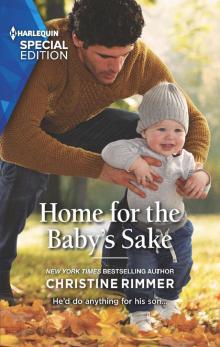 Home for the Baby's Sake
Home for the Baby's Sake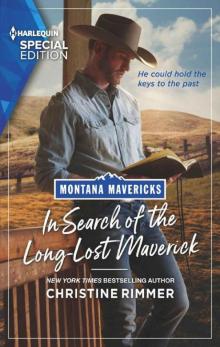 In Search 0f The Long-Lost Maverick (Montana Mavericks: What Happened To Beatrix? Book 1)
In Search 0f The Long-Lost Maverick (Montana Mavericks: What Happened To Beatrix? Book 1) A Temporary Christmas Arrangement
A Temporary Christmas Arrangement Switched At Birth
Switched At Birth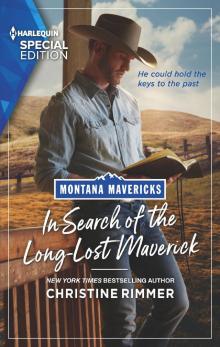 In Search of the Long-Lost Maverick
In Search of the Long-Lost Maverick From Here to Paternity
From Here to Paternity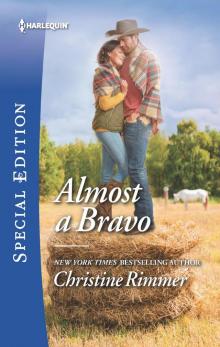 Almost a Bravo
Almost a Bravo Her Favorite Maverick
Her Favorite Maverick A Husband She Couldn't Forget
A Husband She Couldn't Forget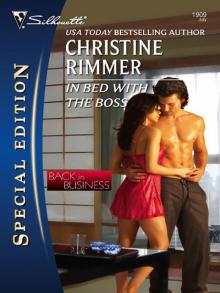 In Bed with the Boss
In Bed with the Boss Bravo Christmas Reunion
Bravo Christmas Reunion The Maverick Fakes a Bride!
The Maverick Fakes a Bride! The Tycoon's Instant Daughter
The Tycoon's Instant Daughter The Bravo Bachelor
The Bravo Bachelor 37 Her Highness and the Bodyguard
37 Her Highness and the Bodyguard A Bravo for Christmas
A Bravo for Christmas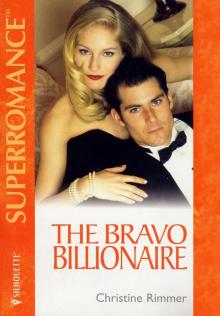 THE BRAVO BILLIONAIRE
THE BRAVO BILLIONAIRE The Rancher's Christmas Princess
The Rancher's Christmas Princess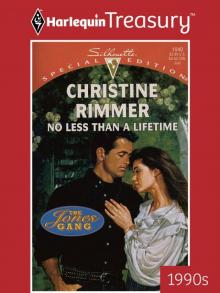 No Less Than a Lifetime
No Less Than a Lifetime A Bravo Christmas Reunion
A Bravo Christmas Reunion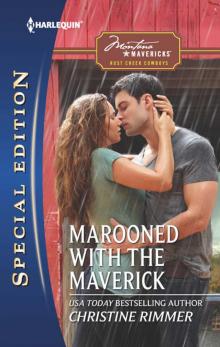 Marooned with the Maverick
Marooned with the Maverick Their Secret Summer Family (The Bravos 0f Valentine Bay Book 7)
Their Secret Summer Family (The Bravos 0f Valentine Bay Book 7) Carter Bravo's Christmas Bride
Carter Bravo's Christmas Bride Stroke of Fortune
Stroke of Fortune THE MILLIONAIRE SHE MARRIED
THE MILLIONAIRE SHE MARRIED Marriage, Bravo Style!
Marriage, Bravo Style! Marriage By Necessity
Marriage By Necessity Marrying Molly
Marrying Molly Married in Haste
Married in Haste A DOCTOR'S VOW
A DOCTOR'S VOW Bravo Unwrapped
Bravo Unwrapped![A Maverick to [Re]Marry Read online](http://i1.bookreadfree.com/i/03/24/a_maverick_to_remarry_preview.jpg) A Maverick to [Re]Marry
A Maverick to [Re]Marry Born Innocent
Born Innocent The Bravo Family Way
The Bravo Family Way The Reluctant Princess
The Reluctant Princess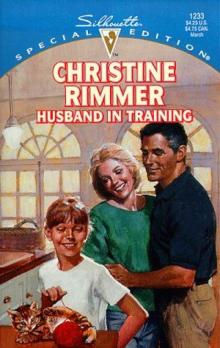 Husband in Training
Husband in Training HOLIDAY ROYALE
HOLIDAY ROYALE James Bravo's Shotgun Bride
James Bravo's Shotgun Bride The Maverick's Accidental Bride (Montana Mavericks: What Happened At The Wedding Book 1) (Contemporary Cowboy Romance)
The Maverick's Accidental Bride (Montana Mavericks: What Happened At The Wedding Book 1) (Contemporary Cowboy Romance) The Stranger and Tessa Jones
The Stranger and Tessa Jones Practically Married
Practically Married The Good Girl's Second Chance (The Bravos Of Justice Creek 2)
The Good Girl's Second Chance (The Bravos Of Justice Creek 2)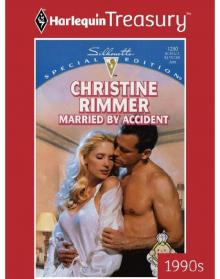 Married by Accident
Married by Accident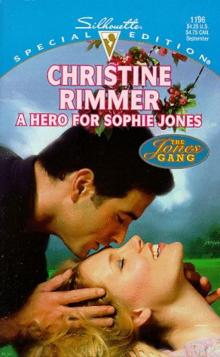 Christine Rimmer - A Hero for Sophie Jones
Christine Rimmer - A Hero for Sophie Jones A Bravo Homecoming
A Bravo Homecoming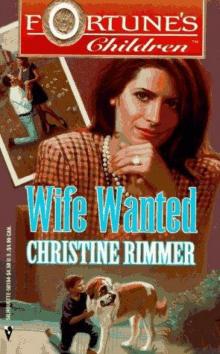 Wife Wanted
Wife Wanted Harlequin Special Edition July 2013 - Bundle 1 of 2: Marooned with the MaverickHer McKnight in Shining ArmorCelebration's Bride
Harlequin Special Edition July 2013 - Bundle 1 of 2: Marooned with the MaverickHer McKnight in Shining ArmorCelebration's Bride Her Favorite Maverick (Montana Mavericks: Six Brides For Six Brother Book 1)
Her Favorite Maverick (Montana Mavericks: Six Brides For Six Brother Book 1)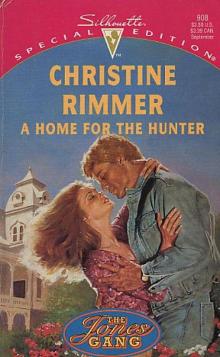 A HOME FOR THE HUNTER
A HOME FOR THE HUNTER![A Maverick to [Re] Marry Read online](http://i1.bookreadfree.com/i1/04/03/a_maverick_to_re_marry_preview.jpg) A Maverick to [Re] Marry
A Maverick to [Re] Marry Lori’s Little Secret
Lori’s Little Secret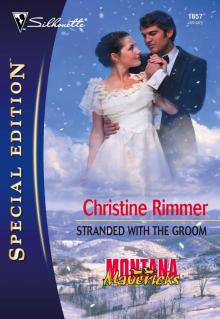 Stranded with the Groom
Stranded with the Groom Sunshine and the Shadowmaster
Sunshine and the Shadowmaster The Last Single Maverick
The Last Single Maverick The Nine-Month Marriage
The Nine-Month Marriage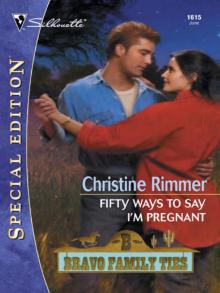 Fifty Ways to Say I’m Pregnant
Fifty Ways to Say I’m Pregnant Ms. Bravo and the Boss
Ms. Bravo and the Boss The Marriage Conspiracy
The Marriage Conspiracy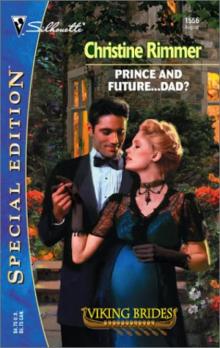 Prince and...Future Dad
Prince and...Future Dad Not Quite Married
Not Quite Married The Reluctant Cinderella
The Reluctant Cinderella Their Child?
Their Child? Marriage, Maverick Style!
Marriage, Maverick Style! Donovan's Child
Donovan's Child A Bride for Jericho Bravo
A Bride for Jericho Bravo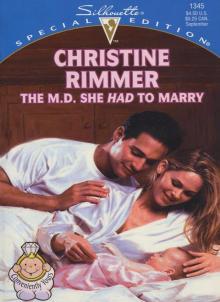 THE M.D. SHE HAD TO MARRY
THE M.D. SHE HAD TO MARRY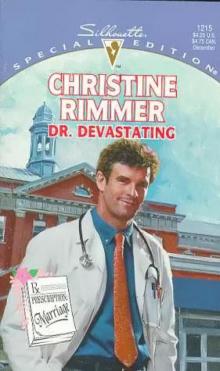 DR. DEVASTATING
DR. DEVASTATING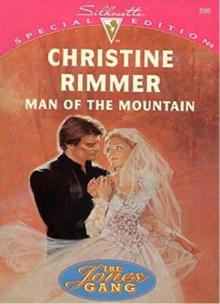 MAN OF THE MOUNTAIN
MAN OF THE MOUNTAIN The Prince's Cinderella Bride
The Prince's Cinderella Bride Rachel's Bundle of Joy
Rachel's Bundle of Joy HOW TO MARRY A PRINCESS
HOW TO MARRY A PRINCESS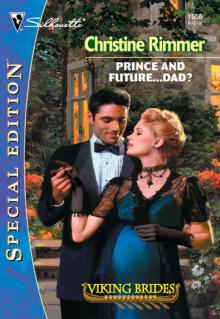 Prince and Future... Dad?
Prince and Future... Dad? The Prince She Had to Marry
The Prince She Had to Marry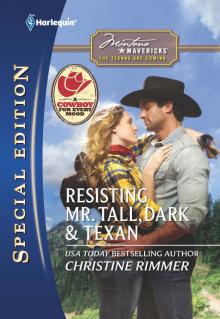 Resisting Mr. Tall, Dark & Texan
Resisting Mr. Tall, Dark & Texan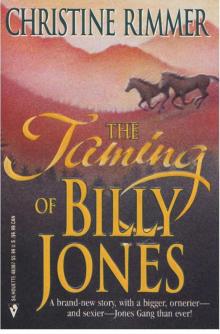 The Taming of Billy Jones
The Taming of Billy Jones McFarlane's Perfect Bride
McFarlane's Perfect Bride The Lawman's Convenient Bride
The Lawman's Convenient Bride The Man, The Moon And The Marriage Vow
The Man, The Moon And The Marriage Vow A Bravo Christmas Wedding
A Bravo Christmas Wedding Scrooge and the Single Girl
Scrooge and the Single Girl Harlequin Special Edition October 2015, Box Set 1 of 2
Harlequin Special Edition October 2015, Box Set 1 of 2 The Marriage Medallion
The Marriage Medallion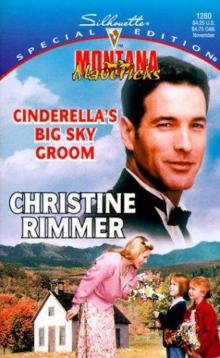 Cinderella's Big Sky Groom
Cinderella's Big Sky Groom 33 The Return of Bowie Bravo
33 The Return of Bowie Bravo The Prince's Secret Baby
The Prince's Secret Baby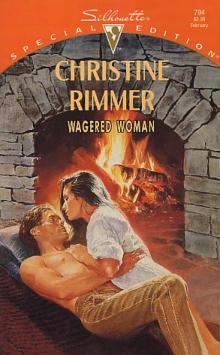 WAGERED WOMAN
WAGERED WOMAN